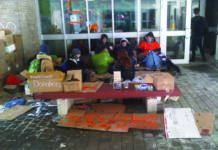Municipalities across Ontario, including Waterloo, will be holding local elections on Oct. 24. Eligible voters in Waterloo will be able to vote for the regional chair, their regional council representative, city council representative, school board trustee and the city mayor. It is absolutely vital that students vote in these elections. Regardless of where in the city they live, UW students will be able to vote in the SLC on Oct. 24.
In talking to many students, I have realized that a lot of them don’t know that they are able to vote in these elections. Canadian citizens enrolled in post-secondary institutions are eligible to vote in two different locations — the city they reside in as a student and their home city, i.e. the place they regularly return to when not at university. This means that most students at the university can vote in these elections.
The regional and city governments are responsible for some of the issues that affect the day-to-day lives of residents, and students in particular — arguably more than any other level of government. Policing, emergency medical services, major roads, waste collection, public transit and public health are some of the issues the regional government deals with, while the city government is responsible for libraries, firefighters, parks, recreational programs and residential roads.
Housing is another major issue that has to be addressed by the city government. The current housing crisis severely affects students to the extent that students have had to find accommodations far from the university or pay exorbitant rent for subpar living conditions.
Another issue that is particularly important for students is transit. Not everyone can afford a car as a student, and many rely on public transit. Moreover, many students also cycle or walk to get around. Having better infrastructure for cycling around the city, more amenities within a walkable distance and a reliable and frequent public transit system are very important for us as students with our busy schedules and limited budgets.
It is crucial that students take the time to find out who the candidates running for city government are and go vote for the ones they think will be able to address these concerns appropriately.
Apart from these issues, which actively affect our day-to-day lives, it would also be a good idea to consider where candidates stand on value-based issues like sustainability, diversity and inclusion. Uncovering which candidates have actively chosen to address these topics in their campaign promises and what their positions are is an important part of understanding who shares your ideals and values.
As Managing Editor for Imprint, I have tried to ensure that students are informed with regard to the elections. On Sept. 28, we published a piece titled “Will you be voting in the municipal elections?” elaborating on the what, who and how of municipal elections. In today’s news section (pg. 2-3), we have published the responses of the City of Waterloo’s mayoral candidates to some of our questions to help our readers get to know them.
The voice of students is important in these elections. It has felt like most candidates have not made an active effort to reach out to the students living in Waterloo, which is simply sad given that the city has a student population of over 50,000. In comparison, in 2018, current mayor Dave Jaworsky won his election by 11,777 votes and Jeff Henry, the Ward 6 councillor — the ward the university falls in — won by 1,415 votes. In fact, Henry had a total of 1,989 votes. Students have the power to sway the entire election one way or another.
While some students may not even know they can vote, I also believe that most are apathetic to these elections. I understand where that sentiment comes from — most students are here temporarily and will be gone before the next elections happen. Many will not even be here after next May, so it makes sense that they don’t particularly care about what happens in the city. As true as that may be, it is important to remember that this city is playing an important role in a major phase of our lives, and we should want it to be a livable, safe and welcoming place for all those who will come after us.































